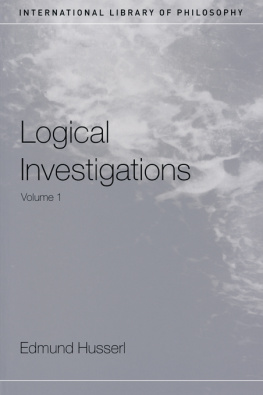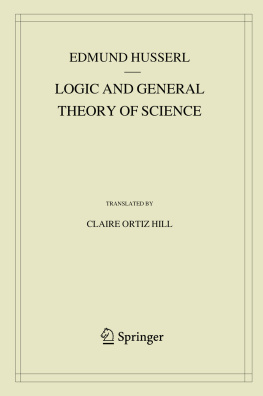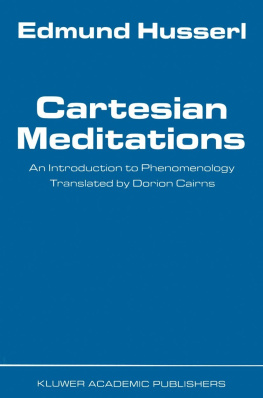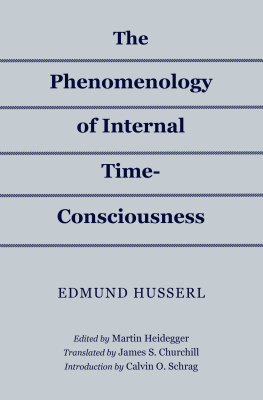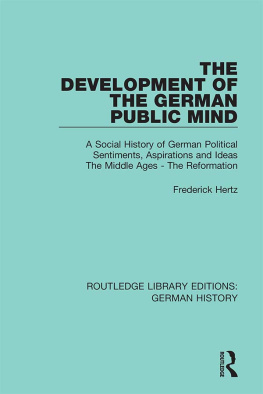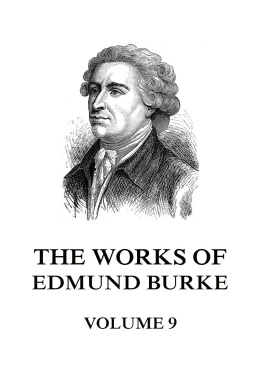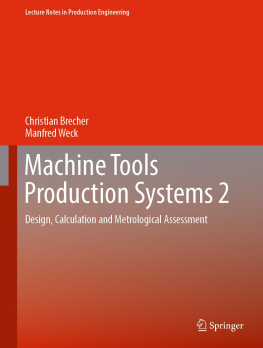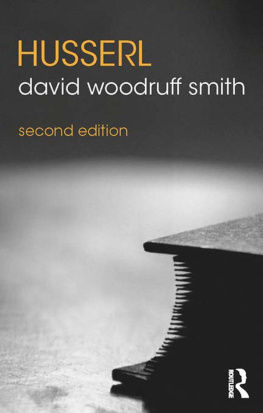Edmund Husserl - Logical Investigations
Here you can read online Edmund Husserl - Logical Investigations full text of the book (entire story) in english for free. Download pdf and epub, get meaning, cover and reviews about this ebook. City: London, year: 2001, publisher: Routledge, genre: Science. Description of the work, (preface) as well as reviews are available. Best literature library LitArk.com created for fans of good reading and offers a wide selection of genres:
Romance novel
Science fiction
Adventure
Detective
Science
History
Home and family
Prose
Art
Politics
Computer
Non-fiction
Religion
Business
Children
Humor
Choose a favorite category and find really read worthwhile books. Enjoy immersion in the world of imagination, feel the emotions of the characters or learn something new for yourself, make an fascinating discovery.
- Book:Logical Investigations
- Author:
- Publisher:Routledge
- Genre:
- Year:2001
- City:London
- Rating:5 / 5
- Favourites:Add to favourites
- Your mark:
- 100
- 1
- 2
- 3
- 4
- 5
Logical Investigations: summary, description and annotation
We offer to read an annotation, description, summary or preface (depends on what the author of the book "Logical Investigations" wrote himself). If you haven't found the necessary information about the book — write in the comments, we will try to find it.
Logical Investigations — read online for free the complete book (whole text) full work
Below is the text of the book, divided by pages. System saving the place of the last page read, allows you to conveniently read the book "Logical Investigations" online for free, without having to search again every time where you left off. Put a bookmark, and you can go to the page where you finished reading at any time.
Font size:
Interval:
Bookmark:

Logical Investigations
Volume I
International Library of Philosophy
Edited by Jos Bermdez, Tim Crane and Peter Sullivan
Advisory Board: Jonathan Barnes, Fred Dretske, Frances Kamm, Brian Leiter, Huw Price and Sydney Shoemaker
Recent titles in the ILP:
The Facts of Causation
D. H. Mellor
The Conceptual Roots of Mathematics
J. R. Lucas
Stream of Consciousness
Barry Dainton
Knowledge and Reference in Empirical Science
Jody Azzouni
Reason without Freedom
David Owens
The Price of Doubt
N. M. L. Nathan
Matters of Mind
Scott Sturgeon
Logic, Form and Grammar
Peter Long
The Metaphysicians of Meaning
Gideon Makin
Logical Investigations, Vols I & II
Edmund Husserl
Edmund Husserl
Translated by J. N. Findlay
from the Second German edition of Logische Untersuchungen
with a new Preface by Michael Dummett
and edited with a new Introduction by Dermot Moran
Volume I
Prolegomena to pure logic
(Volume I of the German editions)
Expression and meaning
(Investigation I, Volume II of the German editions)
The ideal unity of the species and modern theories of abstraction
(Investigation II, Volume II of the German editions)

First published in German as Logische Untersuchungen
by M. Niemeyer, Halle 1900/1901
Second German edition, Vol. I and Vol. II, Part I, first published 1913
First published in English 1970
by Routledge & Kegan Paul Ltd
Reprinted 1976, 1977, 1982
This paperback edition first published 2001
by Routledge
2 Park Square, Milton Park, Abingdon, Oxon OX 14 4RN
Simultaneously published in the USA and Canada
by Routledge
270 Madison Ave, New York, NY 10016
Reprinted 2002, 2003, 2005, 2007, 2008
Transferred to Digital Printing 2008
Routledge is an imprint of the Taylor & Francis Group, an informa business
Translation 1970 J. N. Findlay
Preface 2001 Michael Dummett
Introduction and editorial matter 2001 Dermot Moran
Typeset in Times by Graphicraft Ltd, Hong Kong
Printed and bound in Great Britain by
TJI Digital, Padstow, Cornwall
All rights reserved. No part of this book may be reprinted or reproduced or utilised in any form or by any electronic, mechanical, or other means, now known or hereafter invented, including photocopying and recording, or in any information storage or retrieval system, without permission in writing from the publishers.
British Library Cataloguing in Publication Data
A catalogue record for this book is available from the British Library
Library of Congress Cataloging in Publication Data
A catalog record for this book has been requested
ISBN 978-0-415-24189-2 (Vol. I)
ISBN 978-0-415-24190-8 (Vol. II)
Dedicated to
Carl Stumpf
with Honour
and
in Friendship
PROLEGOMENA TO PURE LOGIC
Volume I of the German Editions
CHAPTER ONE
Logic as a normative and, in particular, as a practical discipline
CHAPTER TWO
Theoretical disciplines as the foundation of normative disciplines
CHAPTER THREE
Psychologism, its arguments and its attitude to the usual counter-arguments
CHAPTER FOUR
Empiricistic consequences of psychologism
CHAPTER FIVE
Psychological interpretations of basic logical principles
CHAPTER SIX
Syllogistic inferences psychologistically considered. Syllogistic and chemical formulae
CHAPTER SEVEN
Psychologism as a sceptical relativism
CHAPTER EIGHT
The psychologistic prejudices
CHAPTER NINE
Logic and the principle of the economy of thought
CHAPTER TEN
End of our critical treatments
CHAPTER ELEVEN
The idea of Pure Logic
66 B. The question as it relates to the content of knowledge
CHAPTER ONE
Essential distinctions
CHAPTER TWO
Towards a characterization of the acts which confer meaning
CHAPTER THREE
Fluctuation in meaning and the ideality of unities of meaning
CHAPTER FOUR
The phenomenological and ideal content of the experiences of meaning
CHAPTER ONE
Universal objects and the consciousness of universality
CHAPTER TWO
The psychological hypostatization of the universal
CHAPTER THREE
Abstraction and attention
CHAPTER FOUR
Abstraction and representation
CHAPTER FIVE
Phenomenological study of Humes theory of abstraction
CHAPTER SIX
Separation of varying concepts of abstraction and abstract
Preface
Edmond Husserls Logical Investigations, little known to English-speaking students of philosophy but well known to most students of the subject with a different mother tongue, is a work of the first importance in the history of philosophy. It was written at a turning point in Husserls philosophical development, between his earlier book, Philosophy of Arithmetic (1891), deeply embedded in the psychologism so prevalent in German philosophy of the time, and the Ideas towards a pure Phenomenology and phenomenological Philosophy (1913) in which the notion of noema was first presented and the programme of phenomenology was first set out. In Philosophy of Arithmetic Husserl had criticised Gottlob Freges Foundations of Arithmetic from a psychologistic standpoint. Psychologism attempts to explain concepts by reference to the inner mental operations supposedly involved in attaining them or grasping them; Frege had engaged in denouncing this methodology the intrusion of psychological considerations into logic and the analysis of meaning from the Foundations of Arithmetic onwards. Husserl, whose previous relations with Frege had been fairly cordial, was deeply affronted by his savage, and in certain respects unfair, review in 1894 of the Philosophy of Arithmetic, and had no further contact with him for the next twelve years. Freges review was his most sustained attack on psychologism; and although it was resented by Husserl for its unkindness, it is widely believed to have influenced him profoundly, albeit some reject this conjecture. However this may be, Husserl had completely changed his attitude to psychologism by 1900. His arguments against it in the Prolegomena often coincided with those used by Frege, although he elaborated them in far more detail. Yet while Freges objections to psychologism had made little impact, that of Husserls assault on it was overwhelming: the Prolegomena came close to killing off the influence of psychologism within German philosophy, although Husserls old teacher Brentano remained bewildered by this turn of events.
Attention to Husserls famous book may help to correct the impression of German philosophy often given by those who declare their enthusiasm for what they describe as the German tradition in the subject. This they see as originating in the work of Hegel and the idealist school generally and of the Prolegomena.
Frege did not see himself as the founder of a school, although he was highly conscious of his divergence from the approaches of other philosophers contemporary with him. Yet nowadays he is recognised by all analytical philosophers as the grandfather of their school of philosophy with Bolzano, whom Husserl so greatly admired, as its great-grandfather. Husserl, on the other hand, set out to be the inaugurator of a new philosophical method; and no one could deny him the title of founder of phenomenology. They were thus progenitors of two philosophical schools that have diverged so widely from one another that communication between them has until recently been almost impossible. Yet, at the time when Husserls
Next pageFont size:
Interval:
Bookmark:
Similar books «Logical Investigations»
Look at similar books to Logical Investigations. We have selected literature similar in name and meaning in the hope of providing readers with more options to find new, interesting, not yet read works.
Discussion, reviews of the book Logical Investigations and just readers' own opinions. Leave your comments, write what you think about the work, its meaning or the main characters. Specify what exactly you liked and what you didn't like, and why you think so.

